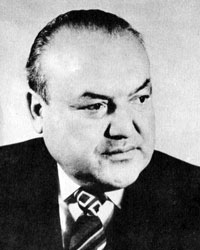SHARE WITH FRIENDS:
 Well-known writer and journalist Ibrahim Rahim was born on October 1916, 15 in Kuva district of Fergana region. At the age of three, he was orphaned by his parents and was raised by his mother, Tokhtabibi. The first devotion to literature also awakens because of the mother. It was this devotion that led him to Tashkent in 1933. Ibrahim Rahim first worked for the newspaper Kolkhoz Yuli. His first works see the face of the world from this period. His poems, essays and short stories were published in the newspapers "Lenin's Spark" (now "Dawn Star"), "Young Leninist" ("Turkistan"). He fought in two wars - Finland and German fascism (1937-1945).
Well-known writer and journalist Ibrahim Rahim was born on October 1916, 15 in Kuva district of Fergana region. At the age of three, he was orphaned by his parents and was raised by his mother, Tokhtabibi. The first devotion to literature also awakens because of the mother. It was this devotion that led him to Tashkent in 1933. Ibrahim Rahim first worked for the newspaper Kolkhoz Yuli. His first works see the face of the world from this period. His poems, essays and short stories were published in the newspapers "Lenin's Spark" (now "Dawn Star"), "Young Leninist" ("Turkistan"). He fought in two wars - Finland and German fascism (1937-1945).
Ibrahim Rahim was the editor of front-page Uzbek-language newspapers. He wrote essays, stories, and messages reflecting the fiery patriotism of our warriors.
The writer, who returned from military service in 1946, worked in the editorial offices of newspapers and magazines in the country.
Ibrahim Rahim served in the Radio Committee of Uzbekistan (1946-1947), studied at the Higher School of the Party (1947-1950), editor of the newspaper "Red Uzbekistan" (1950-1961), head of the film studio "Uzbekfilm" (1960-1966), " He worked as the editor-in-chief of the magazines "Gulistan" (1966-1970), "Mushtum" (1972-1982).
The writer's creative activity dates back to 1938. His first major work was the epic "Bahodir" (1939), written from the life of border guards. In 1953, Ibrahim Rahim wrote the novel The Springs of Life. This work was later revised based on the views and opinions of literary critics and published under the title Ikhlos (1958). Ibrahim Rahim in his novels "True Love" (1958), "Fidoyilar" (1972), "General Ravshanov" (1985) reflected the war life of the heroes of World War II.
The courageous end of the 1966 Tashkent earthquake and its aftermath served as the subject of the author's novel The City Without Rest (1968). His novel "Fate" is dedicated to the construction of a new city. The author's story "Hilola" (1960) is aimed at the artistic solution of important problems of the time, such as the role of women in the collective farm, their promotion to leadership positions, the development of the collective farm economy. The author's short stories "Captain of the Blue Ship", "Fireman" (1960) also reflect the high moral image of our people, their heroism in labor. For his novel The Consequences, the author was awarded the Hamza Republican State Prize (1983).
Ibrahim Rahim also created the dramas Janim Fido and Chaqmoq (1974). The Lightning depicts Mamadali Topiboldiev, an Uzbek man who fought against Nazi invaders in the forests of Belarus. The author is also the author of the film "Farhod's Courage".
Ibrahim Rahim was awarded the title of Honored Artist of Uzbekistan, People's Writer of Uzbekistan.
On the occasion of the fifth anniversary of national independence of Uzbekistan and the 80th anniversary of his birth, he was awarded the Order of Friendship, and then the Order of El-Yurt Hurmati.